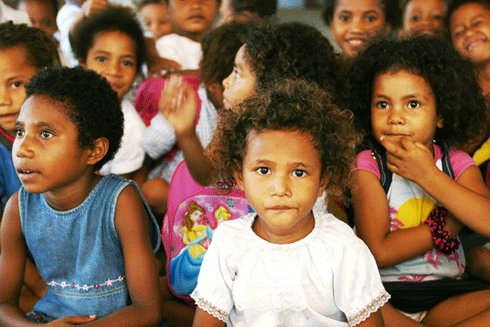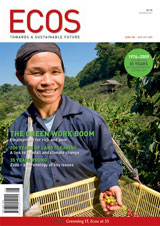
|
Published:
UN–RMIT partnership tackles problems in Pacific cities
In a collaboration that will see more detailed and effective ‘social mapping’ of cities in the Asia-Pacific region, UN-Habitat – the United Nations’ agency for urbanisation and human settlements – has named RMIT’s Global Cities Research Institute in Melbourne as its Asia-Pacific region research partner.

|
|
Children at Vanagi’s community-run preschool in Port Moresby, coordinated by retired local teacher Clement Dogale and based on a model developed at RMIT. Credit: Paul James
|
As home to more than half the world’s population, cities have become hubs for the economic and social processes that generate wealth and opportunity. But they have also become centres of disease, crime, pollution and poverty, especially the growing urban slum areas in countries such as Papua New Guinea (PNG) and other Pacific island nations in the region.
According to Global Cities Director, Professor Paul James, the expansion of urban slums will be a key challenge facing the Asia-Pacific region over the coming decade, along with food security and climate change impacts on coastal and low-lying island settlements.
Prior to the recent announcement of the UN-Habitat partnership, the RMIT researchers had already been investigating the links between livelihoods and learning in PNG, which has a primary school attendance rate of 53 per cent and a 70–75 per cent unemployment rate in urban areas.
The team documented employment and education opportunities in 11 communities, ranging from remote villages in the islands to urban settlements in Port Moresby, including the densely populated squatter community of Vanagi.
Their aim was to determine the feasibility of introducing informal learning programs delivered in a partnership between communities and volunteer providers as an alternative to formal education through schools and colleges. This was part of a new approach advocated by the team, calling for government, businesses and aid groups to help communities move away from Western welfare models – dubbed ‘cargo development’ – to greater self-reliance.
The outcomes of this research may never have been realised had it not been for the extraordinary leadership of education advocate Dame Carol Kidu, Minister for Community Development and PNG’s first female Member of Parliament.
Dame Kidu was instrumental in securing PNG Government support for an Integrated Community Development Policy in 2007 based on research done by the RMIT team. This endorsement paved the way for the creation of a network of locally based Community Learning and Development Centres across the country.
While the RMIT team was developing its model for community learning centres, UN-Habitat was separately undertaking a ‘rapid assessment program’ of sustainability-related issues in Port Moresby slum settlements, but finding it difficult to negotiate the local bureaucracy and culture to get projects implemented.
Now that UN-Habitat is working with Global Cities, it is able to leverage the Australian research group’s knowledge of the culture and its established relationships with government and community leaders.
Professor James says the Vanagi community is no longer one of the most dangerous communities in the country and is well on its way to becoming ‘a well-organised democratised community that has been remaking itself from within’.
The partnership will identify opportunities for further joint projects in PNG, as well as the Solomon Islands and Timor Leste. With many cities in the Asia-Pacific region being coastal, a central research focus will be helping communities – such as Vanagi, where a number of houses are built over water – to adapt to climate change.
Global Cities researchers are also working with the UN-Habitat Observatory in Vancouver to develop a framework of sustainability indicators for cities that takes different economic and cultural settings into account, providing a richer picture of the local political, cultural, economic and physical environments than the one painted by GDP, inflation or unemployment figures.
‘The framework will address shortcomings in traditional indicators for monitoring sustainability, which can become detached from the practical tasks of managing businesses, preserving the environment or promoting social development,’ says Professor James, adding that the research will also help Australian organisations ‘to develop clear, practical sustainability goals, lower the cost of reporting compliance and improve sustainability practices’.
More information:
James P, Nadarajah Y, Haive K and Stead V (2009) Sustainable Communities, Sustainable Development: Other Paths for Papua New Guinea. Globalism Research Centre & Department for Community Development, Papua New Guinea, p. 234.
James P (2006) Globalism, Nationalism Tribalism: Bringing Theory Back In. Sage Publications, London.



